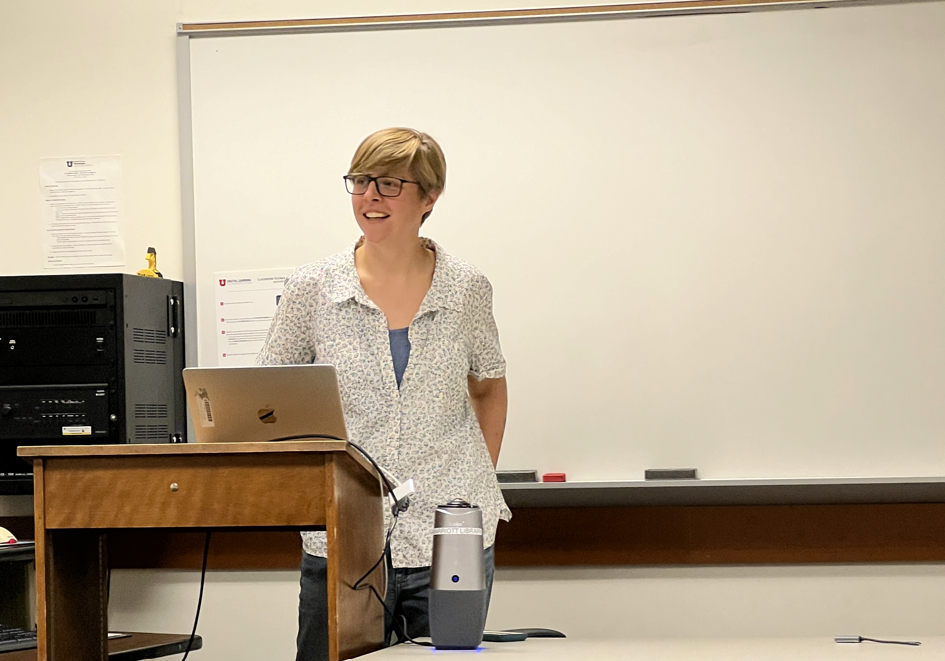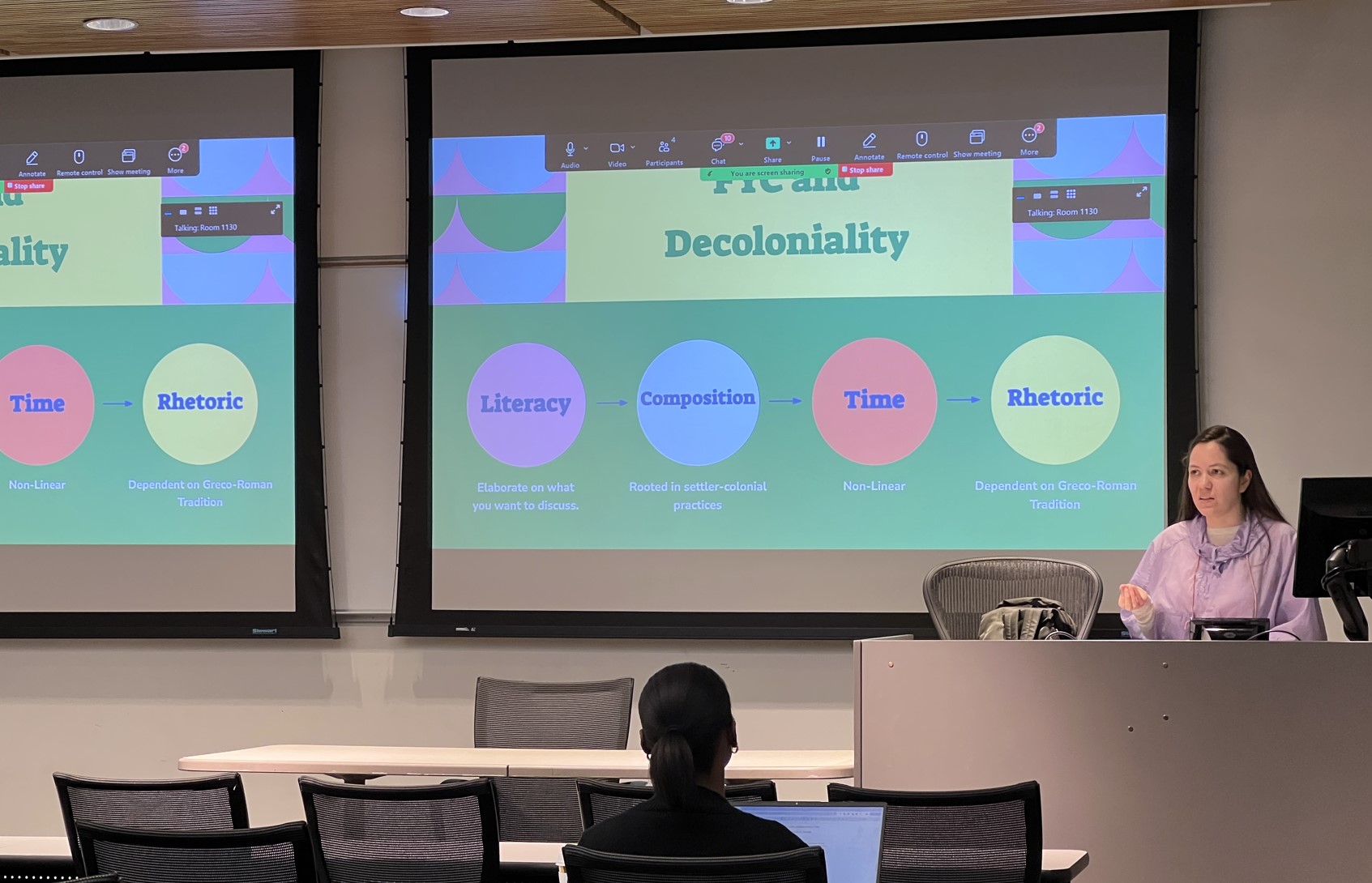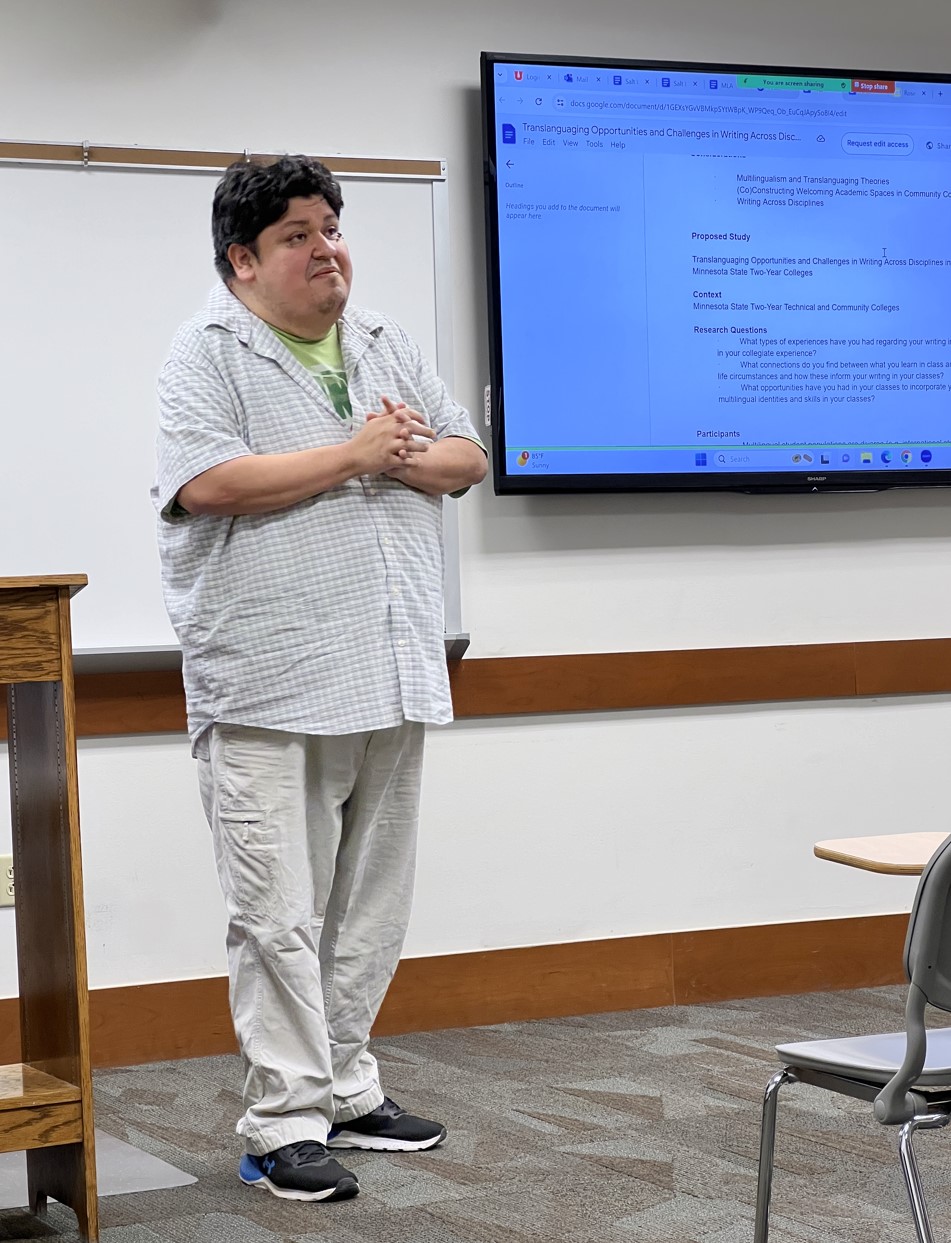MLA Institute on Reading and Writing Pedagogies
The University of Utah's Department of Writing and Rhetoric Studies, in collaboration with Salt Lake Community College’s Department of English, Linguistics, and Writing Studies, co-hosted the second annual MLA Institute on Reading and Writing Pedagogies at Access-Oriented Institutions.

Christie Toth
Professor Christie Toth, Director of Undergraduate Studies and Associate Professor in Writing and Rhetoric Studies, shared insights into the initiative, reflecting the longstanding commitment to supporting community college transfer students and providing professional development for humanities graduate students aiming for careers at open admissions institutions.
This year’s institute, held June 3-7 was attended by 28 participants from 15 different states, and highighted key themes, including the integration of AI in access-oriented institutions, antiracist and antiableist pedagogies, and writing instruction at Hispanic-Serving Institutions.
Q: What inspired the collaboration between the Department of Writing and Rhetoric Studies and Salt Lake Community College’s Department of English, Linguistics, and Writing Studies for this MLA Institute?
A: Actually, MLA approached both our departments in 2022 to invite us to co-host this institute in 2023. They did so on the basis of our long and well-known track record of inter-institutional collaboration to support community college transfer students and create professional development opportunities for humanities graduate students interested in pursuing careers at open admissions institutions. We’ve published about that work in the book Transfer in an Urban Writing Ecology: Reimagining Community College-University Relations in Composition Studies (2024) as well as articles in ADE Bulletin and Teaching English in the Two-Year College. My friend and colleague Dr. Darin Jensen and I also have a long history of scholarly collaboration on the issue of graduate preparation for community college literacy professionals, and Darin joined the faculty at SLCC in 2021. So, I think MLA saw us as natural partners for this work.
MLA gave us $20K to run the institute in 2023, and the College of Humanities generously agreed to provide continued financial support for us to host the institute again in 2024 and, we hope, 2025. So far, we’ve been the only MLA site to host this institute for multiple years, and we’ve also been the only site in the last two years to offer a remote attendance option for folks who are disabled, have caretaking responsibilities or summer teaching obligations, and/or cannot afford the transportation costs. We’ve also been the only institute to offer a graduate credit option that enables participants to continue developing the pedagogical inquiry projects they incubate at the institute through the rest of the summer. We’re currently talking with MLA about what 2025 might look like.
Q: How has the collaboration with Salt Lake Community College enhanced the overall experience and outcomes of the institute for participants?
A: Honestly, it’s been essential that this institute be a full partnership with SLCC colleagues. In both 2023 and 2024, we held the first four days of the 5-day institute at SLCC’s South City campus, so we were physically immersed in the community college setting, with SLCC students, staff, and faculty colleagues going about their work around us.
One of our primary goals for the institute is to create opportunities for graduate students and early career faculty to find and join the national professional community of two-year college literacy professionals. The first four days of the institute have featured topical panels of guest speakers at community colleges and other access-oriented institutions across the country, including many leaders in the Two-Year College English Association (TYCA) and several SLCC colleagues who are leading scholars in two-year college literacy studies, including Tiffany Rousculp, Melissa Helquist, Bernice Olivas, Joanne Baird Giordano, and Clint Gardner. Darin Jensen is the current editor of Teaching English in the Two-Year College, the flagship journal for two-year college literacy studies, and he’s taken the lead on mentoring several institute participants in developing their projects for publication in the journal. If the institute was not a deep and equitable partnership with SLCC, we would not be able to center the intellectual work of community college teacher-scholar-activists in the ways Darin and I believe are necessary for providing meaningful professional development for working in these spaces.

Q: How was this year's key themes of antiracist and antiableist reading and writing pedagogies integrated into the institute's curriculum?
A: This year, we were really fortunate to be joined in person by Dr. Caleb González of the University of Texas Río Grande Valley, whose research focuses on writing pedagogies and writing program administration in two- and four-year Hispanic-Serving Institutions (HSIs). On the first day of the institute, Dr. González shared insights about anti-racist and culturally sustaining literacy pedagogies emerging from HSIs, and every day’s reading options included HSI-related scholarship recommended by Dr. González, as well as scholarship emerging from Historically Black Colleges and Universities or Predominantly Black Institutions. On Tuesday, we hosted a panel on reading pedagogies that included Dr. Emily Suh, a preeminent scholar on anti-racist reading pedagogies, and her research on this topic was also included in the daily readings. On Wednesday, we were thrilled to host a virtual panel on writing pedagogies that included Dr Melissa Helquist and Dr. Ada Hubrig, both noted scholars working at the intersections of writing, literacy, and disability studies, particularly at access-oriented institutions. Each day’s reading options also included pieces related to anti-ableist and trauma-informed literacy pedagogies. Thursday’s readings and discussions focused largely on anti-racist and anti-ableist perspectives on writing assessment and writing program policies.
Q: Can you share some insights on how the option to earn graduate credit has impacted the participation and engagement of the attendees?
A: I’ve had the privilege of continuing to work with those institute participants who are interested in earning graduate credit for attending the MLA institute and continuing to work on their projects through the remainder of the summer. Particularly for those participants who are graduate students, I think this has been a useful way to deepen their reading on literacy pedagogies at access-oriented institutions as well as extend their mentorship experience and build connections with fellow graduate students and early career faculty beyond their own institutions. People have used the additional support of grad class to redesign course curricula for the coming year, to develop IRB proposals for scholarship of teaching and learning projects, and to develop essays for publication. Thus, this additional support has had a direct impact on student learning at multiple community colleges, in University of Utah courses taught by graduate student attendees, and knowledge-making in the field.
Q: What impact do you believe the institute has on graduate students and early career faculty in terms of their professional development and career aspirations?
A: Two of the graduate students who participated in the Summer 2023 MLA institute went on the job market in 2023-2024 and got excellent tenure-track faculty positions at community colleges. I think it’s helped several other graduate students who are at earlier stages in their journeys find critical scholarly conversations and professional community centered on access-oriented institutions that they may not have otherwise encountered during their graduate studies.

Q: How do you see the role of AI evolving in access-oriented institutions, and what discussions or insights emerged during the institute regarding this topic?
A: There were several students at both last summer and this summer’s institute who were specifically interested in how AI is reshaping literacy pedagogies, particularly in the context of access-oriented institutions. We’ve had several participants develop pedagogical inquiry projects focusing on how to integrate critical, ethical engagement with AI into their pedagogical practices, including one project specifically focused on multilingual students’ engagements with AI and another examining approaches to AI in writing center pedagogies. This year, we also read the joint MLA-CCCC Taskforce statements on AI, and much of our group discussion focused on how to ensure that students at access-oriented institutions gain full access to opportunities to learn about and engage ethically with AI-based reading and writing resources. We also talked about the kinds of work literacy professionals need to do within our institutions to help colleagues across the disciplines enact effective and equitable policies regarding AI and writing.
Q: Looking ahead, what are your hopes and plans for the future of the MLA Institute and the College of Humanities, and how do you envision it evolving?
A: Our long-term hope is that the MLA institute will become a regular annual opportunity for graduate students in Writing and Rhetoric Studies and English at the University of Utah and other universities in Utah, for early career faculty at SLCC and other access-oriented institutions across the region, and for graduate students and early-career faculty across the US and beyond who are particularly interested in learning from and participating in the intellectual work of literacy professionals at community colleges and other access-oriented institutions. Going forward, we think it might improve everyone’s experience if we hold the in-person and remote versions of the institute separately rather than trying to manage both those modalities during the same week. Ultimately, Darin and I hope that this institute will become the cornerstone of a low-residency PhD program focusing on two-year college literacy studies that my department is currently discussing.
Q: Can you discuss the importance of having a program that specifically addresses the needs of access-oriented institutions and how it benefits the academic community?
A: In our collaborative scholarship as well as work that we’ve each done independently and in collaboration with other two-year college literacy studies
scholars, Darin and I have long critiqued the disjunctures between graduate education in English and writing and rhetoric studies at the distinctive missions, material conditions, student populations, and pedagogical demands of teaching literacy at community colleges. These gaps serve graduate students poorly: those students often leave graduate school with an inaccurate understanding of the actual landscape of postsecondary literacy instruction, poorly positioned to apply for faculty positions at access-oriented institutions and, most importantly, poorly equipped to teach students in these settings. Those structures contribute to inequitable outcomes across the entire postsecondary system. The MLA institutes are addressing a big gap in most graduate students’ professional preparation and helping to create mechanisms that connect faculty at access-oriented institutions to broader networks of pedagogical and professional support—they help them find the important, critical conversations emerging from these spaces. I don’t think the institutes entirely solve what we see as a pretty massive structural problem in graduate education, but they are an important piece of infrastructure that didn’t exist until very recently. I’m honored that my department and my SLCC colleagues have been able to contribute our time, professional networks, and intellectual labor to this effort, and I’m very grateful for the significant support that the College of Humanities that has made our contributions possible.
Q: What does the successful hosting of the MLA Institute for a second year mean for the reputation and standing of the University of Utah within the national academic community? What new elements or improvements were introduced this year to enhance the experience for participants?
A: In 2024, Darin and I were really fortunate to be joined by Melissa Valerie as co-facilitator. Melissa spent many years as a literacy teacher in CUNY’s Burrough of Manhattan Community College and is now a doctoral student at the University of Michigan. She attended the 2023 Institute and had such great ideas for the 2.0 version that we invited her to work with us, and it’s probably the best decision we made all year. Melissa did a great deal to strengthen the institute’s curricular focus on reading pedagogies and anti-racist practices. She also helped improve engagement opportunities for remote attendees, created more space for connecting the readings to concrete classroom practices, and she set up systems to enable all attendees to share resources with each other. I’m now a decade out from my own years as a grad student, and I’m so grateful for all the ways Melissa helped us make the institute more responsive to where graduate students and early career faculty are at. I think Melissa’s contributions, Caleb González’s focus on HSIs, and our expanded focus on anti-ableist pedagogies were all improvements this year that I hope we can build on.
This time around, we think we also developed a much more effective way for both in-person and remote attendees to share their pedagogical project presentations with each other on the final day of the institute. The symposium-style setup enabled family members, friends, and colleagues to attend from as far away as Nigeria! On the last day, we also added breakout sessions focusing on putting together conference proposals for the Two-Year College English Association (TYCA) and on publishing in Teaching English in the Two-Year College. We’re hoping to build a very intentional, supported mentorship path for MLA institute participants to eventually publish their work in TETYC so the whole field can learn from what’s emerging from this space.
